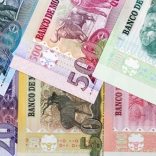Mozambique: 13th-month for public workers maintained but no carry-over allowed
Mozambique: Price, liquidity of restructured debt ‘may be affected by lawsuits’

in file CoM
Mozambique’s government has warned holders of its sovereign debt that the new securities created as part of a financial restructuring currently being negotiated may be “negatively affected in price and liquidity” by ongoing lawsuits.
It is possible, the government states in a Consensus Solicitation Memorandum sent to investors last month that Lusa has seen, that over time there are more individuals or legal entities in Mozambique or abroad that may be involved in the restructuring process, and that the scope of the claims and compensations sought by the parties may change.
The outcome of these processes, it goes on, may have a real impact on the ability to serve this new debt and other external debt obligations.
The memorandum details all procedures planned to restructure public debt securities, and warns that “the outcome of these procedures … may have financial, legal and adverse policy implications in Mozambique, and may affect investor sentiment [as well as] the price and liquidity of new securities.”
At issue are legal proceedings going through the courts in London and other jursidictions, brought by the attorney-general of Mozambique against the banks Credit Suisse and VTB, and several former bankers, in addition to the director of Privinvest, who organised the loans to the public companies Mozambique Asset Management and ProIndicus that are at the centre of the so-called ‘hidden debts’ scandal, whereby loans were taken out by the companies and guaranteed by the state without the knowledge of parliament and other creditors.
On Monday, Lusa reported that the government is seeking to ensure that Credit Suisse and VTB do not receive the value of loans they made, but rather pay compensation for the crisis that they helped create.
“Mozambique is claiming compensation and/or a contribution for any liability it may have towards holders of sovereign debt securities and the total cost of debt service and associated costs related to the new securities to be issued under the restructuring process, together with the macroeconomic losses which result from the irregularities of the defendants,” the government states in the memorandum.
The document is the first time in which it has been set down in writing that the lawsuit admitted to the courts in London includes a claim for compensation in relation to the impact of the hidden loans on the country’s economic prospects.
The revelations come a few days before the end of the deadline by which holders of the $726.5 million in sovereign debt securities must decide whether they accept the proposal to restructure the debt, which essentially consists in delaying start of repayments in return for a higher interest rate.
In February, the attorney-general’s office was allowed to lodge in the Supreme Court in London a civil suit against Credit Suisse International, Credit Suisse AG, and former Credit Suisse employees and agents who facilitated loans to Proindicus, Mozambique Asset Management and several other entities within the Privinvest group who hammered out the loan contracts.
In July, another suit was lodged specifically against the managing director of Privinvest, Iskandar Safa, seeking among other things “compensation for losses suffered by the country under the guarantees allegedly issued by the former minister of finance” Manuel Chang, according to the memorandum, citing documents that not yet been been disclosed.
“Mozambique’s argument is that the transactions involving Proindicus, MAM and Ematum, and the alleged nominal guarantees of each company, were part of a fraudulent scheme designed to obtain and hold Mozambique liable for approximately US$2.2 billion, and that Mozambique was misled in the exchange of [Ematum] bonds for sovereign debt in 2016, ” the memorandum reads, confirming the government’s official claim that these loans “do not constitute a valid or legal obligation attributable to Mozambique.”
The government’s lawyers argue that the revelations about the fraudulent loans led to the International Monetary Fund and international donors cutting off financial aid, which together with the depreciation of the metical and a drop in the selling prices for commodities produced in the country, has halve the rate of growth of gross domestic product since 2015.
“The immediate consequence of these hidden loans and state guarantees included the suspension of IMF and donor disbursements, negatively affecting the government’s financial position and reducing the financial resources available for the government to address economic and development challenges as well as the impact of natural disasters,” the memo read












Leave a Reply
Be the First to Comment!
You must be logged in to post a comment.
You must be logged in to post a comment.